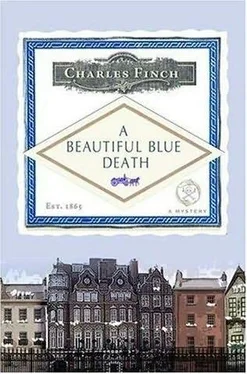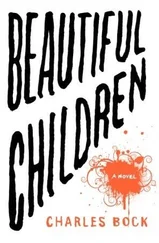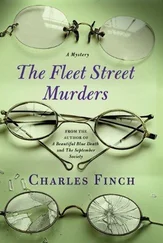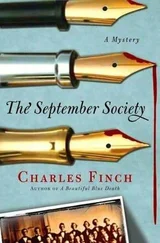Charles Finch - Beautiful blue death
Здесь есть возможность читать онлайн «Charles Finch - Beautiful blue death» весь текст электронной книги совершенно бесплатно (целиком полную версию без сокращений). В некоторых случаях можно слушать аудио, скачать через торрент в формате fb2 и присутствует краткое содержание. Жанр: Исторический детектив, на английском языке. Описание произведения, (предисловие) а так же отзывы посетителей доступны на портале библиотеки ЛибКат.
- Название:Beautiful blue death
- Автор:
- Жанр:
- Год:неизвестен
- ISBN:нет данных
- Рейтинг книги:5 / 5. Голосов: 1
-
Избранное:Добавить в избранное
- Отзывы:
-
Ваша оценка:
- 100
- 1
- 2
- 3
- 4
- 5
Beautiful blue death: краткое содержание, описание и аннотация
Предлагаем к чтению аннотацию, описание, краткое содержание или предисловие (зависит от того, что написал сам автор книги «Beautiful blue death»). Если вы не нашли необходимую информацию о книге — напишите в комментариях, мы постараемся отыскать её.
Beautiful blue death — читать онлайн бесплатно полную книгу (весь текст) целиком
Ниже представлен текст книги, разбитый по страницам. Система сохранения места последней прочитанной страницы, позволяет с удобством читать онлайн бесплатно книгу «Beautiful blue death», без необходимости каждый раз заново искать на чём Вы остановились. Поставьте закладку, и сможете в любой момент перейти на страницу, на которой закончили чтение.
Интервал:
Закладка:
“Ah, Mr. McConnell. Knows a far sight more than many of the trade about their work. Yes, he would know of Jerry Jones.”
“Is this Jones a man to deal with?”
“He is,” Jensen said. “A peculiar man, Mr. Lenox, but honest.”
“And not likely to bridle if I ask him whether he has sold a vial of poison recently and to whom?”
“He might be, sir, he might be. Wait a moment, though.”
Jensen turned around and wrote something on a piece of paper. Then he folded it twice and handed it to Lenox.
“Give him this note and two pounds, Mr. Lenox, and be careful you don’t read the note.”
“As you say, Mr. Jensen. Thank you, as always.”
“A pleasure, sir.”
“One of these days I’ll buy something, perhaps.”
“Well, sir, I’ve seen a ghost now, so my days of nonbelieving are over. But anything for Lady Grey.”
Both men laughed again, and Lenox waved goodbye as he went out the door. He came back into the store a moment later.
“It may be today after all,” he said, reaching into his pocket. He found the small brown-stoppered bottle of poison from Prue Smith’s desk and set it before Jensen. “Any chance of tracing this to its owner?”
Jensen picked it up and looked carefully at the crest on the stopper, where a row of numbers were printed into the glass. “I could try,” he said. “Arsenic, is it?” “I think so. How did you know?” “Common, this sort of bottle. Let me keep it.” The old man put it into his pocket, and Lenox said goodbye again and went outside to a waiting cab, having foolishly elected to send his carriage home after the morning errands. He gave the cabbie the address McConnell had written for him and settled back in his seat.
“Are you sure?” the driver asked. “Penny Farthing Place, sir?” Lenox looked at the paper. “That’s right,” he said, so the man shrugged and lifted the reins.
They rode through Grosvenor Square and through the streets inhabited by those of Lenox’s friends who lived in large, freshly painted houses, with activity within and without; then, gradually, there was a subtle change and they were riding through streets slightly less well-founded, where perhaps the paint was a few years older; then, after those, through streets Lenox had never seen; and, at last, into the fringe of the Seven Dials.
When people thought of London, they generally thought of the West End as aristocratic and East London as poor, and while this was generally true, the poorest part of London, the Dials, was in the West End, just a ten- or fifteen-minute drive from Lenox’s house.
The neighborhood had gotten its name from a meeting of its seven largest avenues; it was the sort of place where the streets were so narrow that the sky looked dark, and the cobblestones were cracked and broken. There were dozens of pubs, called the Queen’s Arms or the Prince and Peasant, all badly lit, with pints of penny gin. Dogs ran in the streets, and scavengers traveled along the sewers, some of them children, looking for the glint of a spare coin, a pack of cigarettes, even a length of rope, anything to sell. Nobody had enough room to live.
But the Dials wasn’t the worst part of London in Lenox’s opinion; that was the Rookery, by Bainbridge Street in East London. The vices here were drink and cruelty. The vices there were theft and prostitution. The Rookery was the home of the Hammer Gang, which Edmund had told him might have been involved in the attempts on the mint.
The cab stopped in front of a tiny brick house with broken windows and no shingle declaring its business.
“Will you wait?” Lenox asked.
“Not likely, sir.”
“This ride has cost a shilling, correct? Here’s a shilling. And now here’s another,” he said, pulling it from his pocket and showing it. “It’s yours if you wait for ten minutes. After ten minutes, you may leave.”
The man looked at him warily and said, “Fine.”
Lenox nodded and slid into the street. He looked at his pocket watch, said, “Ten minutes, beginning now!” and knocked on the door.
Jeremiah Jones spent forty-five of Lenox’s precious seconds coming to the door, and another fifteen asking him what his business was. He was a thin stooped man, with wild white hair sticking up, an uneven collar, and spectacles on the tip of his nose. When the detective handed over the piece of paper and the money, the man looked at the paper, smiled thinly, pocketed the money, and walked inside, leaving the door open, which was, Lenox presumed, an invitation to go in.
The room he entered was perhaps six feet high, so low that both men had to stoop. There was one table in the middle of it, and one chair. On the back wall was a door, which must have led to the living quarters and the storeroom. The potions were nowhere to be seen, but there was a large ledger on the table and a gilt silver pen on top of it. Other than the table, the chair, the book, the pen, and a small kerosene lamp, the room had only one distinguishing feature: an enormous boy of fifteen, strong, fat, and tall, who appeared to be eating an entire black sausage-or at least he had eaten half a foot of it and looked by no means ready to slow down. He was sitting on a stool.
“Yes?” said Jeremiah Jones.
“I need to know about bella indigo.”
Jones took a snuffbox from his pocket, pinched a large amount of snuff, and stared at it, rolling it reverently between his fingers. Lenox felt his ten minutes melting away. But at last the chemist placed the snuff in his nostril and snorted it in. Then, mystify-ingly to Lenox, who still had one eye on the boy and his food, Jones simply left the room through the door in the back wall.
Lenox counted to sixty before he asked the boy, as politely as he knew how to, where the man had gone. The boy looked up slowly and said, “He gone through that door.”
This could have been more helpful. “What’s in there?” Lenox asked.
“D’you ’ave summing to eat?”
In the best society such an abrupt change of subject was unusual, but Lenox searched in his pocket and produced a piece of candy. The boy looked at it the way a lion might look at a bony old antelope, half hungry and half disappointed, as if he had been hoping that Lenox might produce a twelve-pound roasted chicken.
“Another room,” he said, reaching for the candy. “That’s what’s in there.”
Lenox gave up, and the two resumed their rather gloomy silence. After another half minute, though, Jones came out again, carrying a small turquoise bottle.
“Fifty pounds,” he said. “But it’s nearly eleven months old.”
“Why does that matter?”
Jones looked up. “Because bella indigo only lasts for a year after it’s brewed.”
“Where do you get more?”
“Oxford.”
“The university?”
“The only place in England that grows it. Or in Europe, for that matter. It’s a famous poison, in my trade, from Asia, but only Oxford dares to grow it.”
“And sells it?”
“Oh, no-never. They wouldn’t sell it. Very closely restricted.”
“Then how did you get it?” Lenox asked.
“Well, not never. See now, would you like to buy it?”
“Can you tell me when the last bottle of bella indigo was bought and by whom?”
“Do you have two more pounds?”
Lenox handed over the money, and Jones pulled open his book, which seemed to be cross-referenced, in a remarkably Byzantine way, by the potion’s source.
“Four years ago,” Jones said.
“So the bottle you sold would no longer be effective?”
“No.”
“And you’re the only person in London, or in England, who sells it.”
“Yes.”
“Except for the person who gives it to you from Oxford?”
Jones slammed the book shut and carefully capped the pen and placed it back on top of the ledger. “Good day, sir,” he said.
Читать дальшеИнтервал:
Закладка:
Похожие книги на «Beautiful blue death»
Представляем Вашему вниманию похожие книги на «Beautiful blue death» списком для выбора. Мы отобрали схожую по названию и смыслу литературу в надежде предоставить читателям больше вариантов отыскать новые, интересные, ещё непрочитанные произведения.
Обсуждение, отзывы о книге «Beautiful blue death» и просто собственные мнения читателей. Оставьте ваши комментарии, напишите, что Вы думаете о произведении, его смысле или главных героях. Укажите что конкретно понравилось, а что нет, и почему Вы так считаете.












